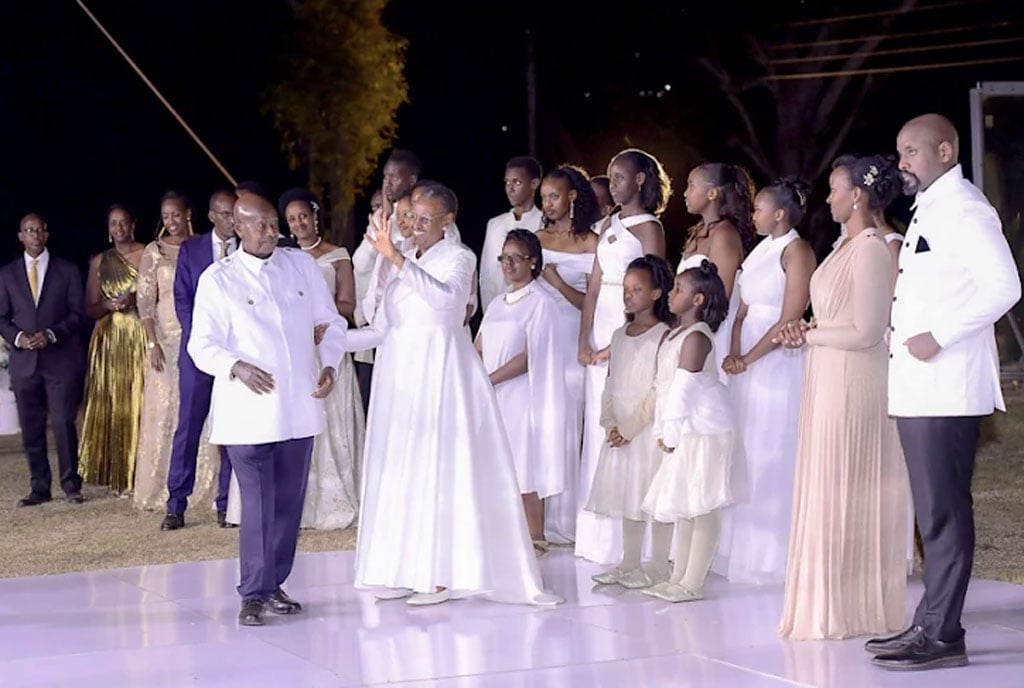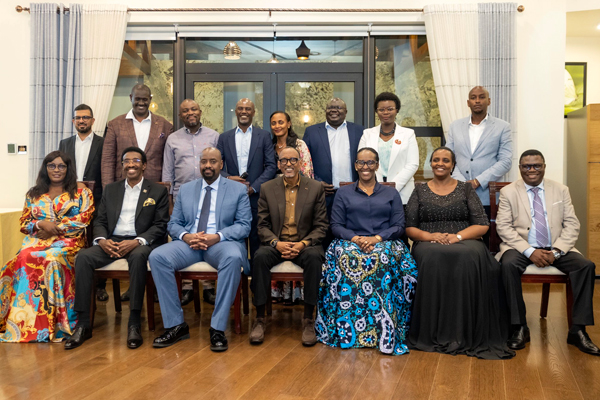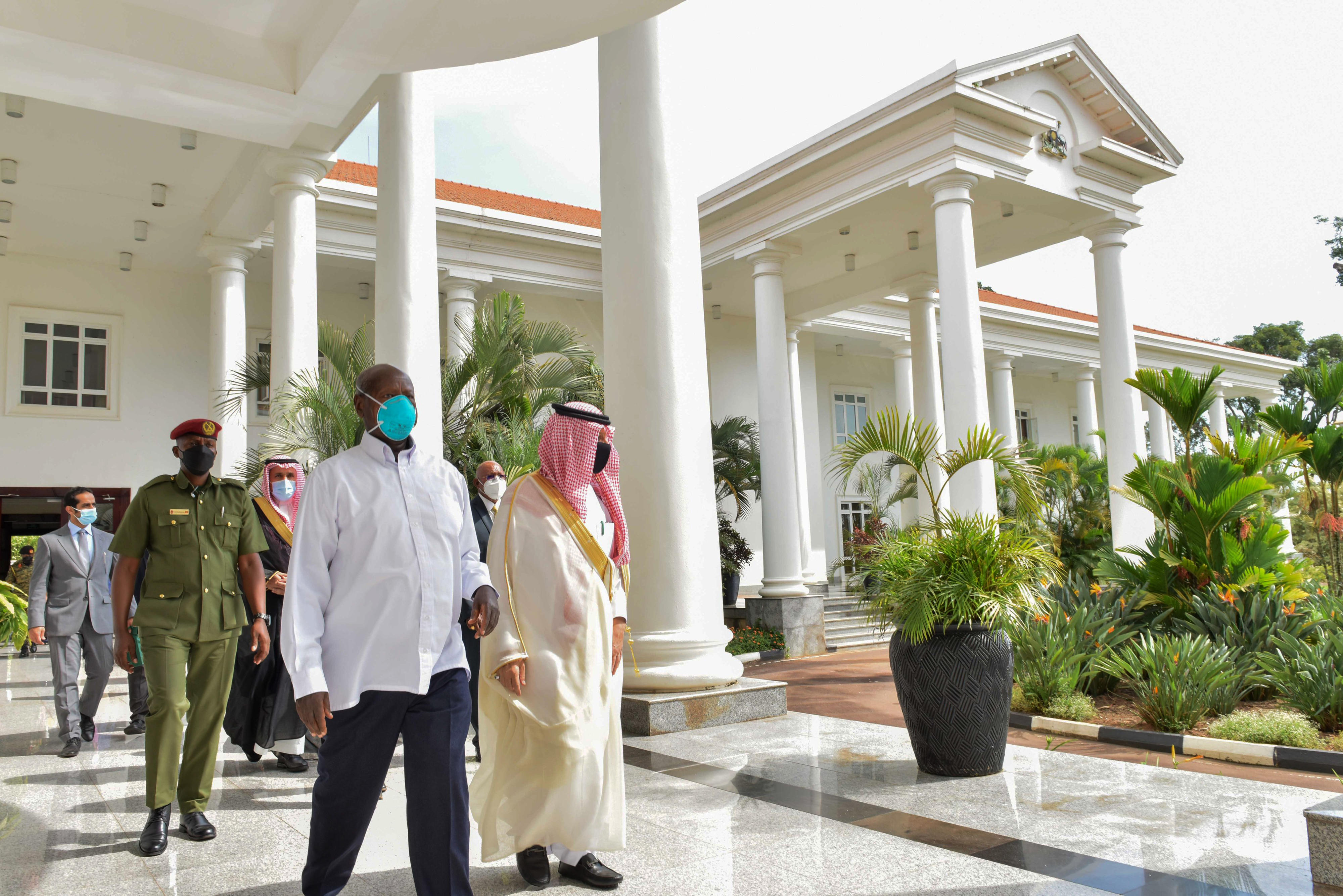Prime
'Partying among poor': Spotlight on First Family spending sparks debate

Members of Uganda's First Family pose for a photo during celebrations to mark President Museveni and Janet Museveni's 50th wedding anniversary in Ntungamo District in August 2023. PHOTO/COURTESY
What you need to know:
- State House shot back, saying "President Museveni needs no lecture on frugality because he already is a modest man."
The Office of the National Chairman (ONC) of the National Resistance Movement (NRM) on Friday held a massive pre-birthday party for President Museveni, merging it with a celebration of heroes of the Katonga battle.
The success in the fighting at Katonga, a key bridge in Mpigi District connecting central and western Uganda, was a game-changer in the National Resistance Army’s (NRA) guerrilla onslaught on Kampala to install Mr Museveni as President in 1986.
At the weekend observance at the Kololo Ceremonial Ground in the capital, there was plentiful food, drinks and entertainment for the merrymakers drawn from diverse backgrounds.

President Museveni and first lady Janet Museveni cut cake during a pre-event to mark his birthday at Kololo in Kampala on September 8, 2023. PHOTO/HANDOUT
President praised the organisers, which incidentally was his Kyambogo office as national chairman of the ruling NRM, for honouring them.
The functions of this office, based in the city outskirt of Kyambogo, appear to duplicate the mandates of the party secretariat on Kyadondo Road in Nakasero.
Another birthday bash is planned for the President, also in the leafy Kololo this Friday, during which artiste Emma Nsereko, better known by his stage name Munamasaka, will launch his song titled Museveni awooma.
Partying among poor
According to broadcast adverts, the upcoming event is being jointly organised by the musician and NRM secretariat.
However, Mr Richard Todwong, the NRM party secretary general, distanced themselves from being co-organisers of the planned fete, saying they have only been invited like other guests.
The back-to-back shindigs follow a lavish 50th anniversary of Museveni’s marriage to Ms Janet Kataha. A year back, their son, Gen Muhoozi Kainerugaba, crisscrossed the country for his 49th birthday parties, tinged with political undertones.
These public celebrations of other private ceremonies are a new addition in the life of the First Family, opening the members up for scrutiny by, among others, Kira Municipality Member of Parliament (MP) Ibrahim Ssemujju as out-of-touch with the reality of majority suffering Ugandans.
The optics of opulence at fetes by members of the First Family has turbo-charged criticism, especially among political opponents, with a first question being about the source of the money for the indulgence.
Ms Brenda Tibamwenda, the spokesperson of the Office of the National Chairman (ONC), which organised the Friday bash, yesterday said she did not know where the money they used came from and asked Monitor to “just omit” (sic) the story.
It was in response to a similar question that NRM secretariat head Todwong noted that their participation in the upcoming Museveni birthday festivities would be as guests, not financiers or co-organisers, despite announcements on television and radio stating otherwise.
In the past, the Muhoozi camp, which has proclaimed intentions of taking over state power, said his birthday bashes in different parts of the country were organised and bankrolled by well-wishers.

Rwandan President Paul Kagame (centre, seated) hosts Gen Muhoozi Kainerugaba and his delegation for an evening to celebrate the First Son’s 49th birthday in April 2023. PHOTO/ COURTESY
It was unclear if taxpayers’ money was injected and, if so, how much. However, the events drew record numbers of government employees, who used official resources, among them cars and fuel assigned to them for work, to attend.
Senior army officers were present in uniform at the parties where Gen Muhoozi and acolytes arrived in long motorcades heavily guarded by Uganda’s military and other state agents.
Even without the birthday celebrations, some of these perks are available for his protection as a First Son, a four-star Uganda People’s Defence Forces (UPDF) general and being his father’s senior advisor on special operations.
Expensive President?
It is from the long convoys enjoyed by principal First Family members, huge escort numbers and public display of ostentation that MP Ssemujju, a fortnight ago, went public with a breakdown of the rising cost of the President and his family for the Ugandan taxpayer.

Kira Municipality Member of Parliament, Mr Ibrahim Ssemujju Nganda.PHOTO | DAVID LUBOWA
He cited the budget allocations to State House, the official residence of the President and Executive seat of government, and the Office of the President, whose mission is to “provide leadership in public policy management and good governance for national development”.
In the Financial Year 2023/24 read in June, a total of Shs696b has been budgeted for the two offices that courtiers said support the Head of State to fulfil his functions as the country’s political chief executive.
Of this, Shs421b is allocated for State House, while the Office of the President has been given Shs274b.
Analysts characterise many of the expenditures, including a combined Shs52b on more than 1,700 employees under the two offices, as largely duplicated and nugatory.
For example, under the Office of the President are 82 presidential advisors, many of whom complain that they hardly access the President, let alone advise him.
Mr Museveni instead advised them during their first collective interface at the National Leadership Institute Kyankwanzi (NALI) in December 2021.
An additional 27 senior presidential advisors cost the country Shs9b in annual salaries as at June 30, according to details in the Ministry of Public Service’s Circular Standing Instruction Number 3 of 2023.
Renting offices for some of them at Kingdom Kampala Building on Nile Avenue costs Shs6b, said lawmaker Ssemujju, who argued that expenditures on State House and Office of the President were exorbitant and opulent, contrasting with the misfortunes of millions of poor citizens.
About 12.3 million Ugandans live below the poverty line, according to the 2021 United Nations Common Country Analysis, despite years of government wealth creation programmes, the latest being the Parish Development Model.

President Museveni arrives at Kololo Ceremonial Grounds for the State of Nation Address in 2021. A total of Shs57.1 billion has been ring-fenced for refurbishing Entebbe State House; procuring support vehicles, among others. PHOTO/ABUBAKER LUBOWA
The profligacy in the name of the President is “useless”, separately argued a scholar, a civil society leader and MP Ssemujju, considering the government is under pressure to urgently muster additional resources to cover the gap created by World Bank’s freezing of approval of new loans for Uganda over the Anti-Homosexuality Act, 2023.
The Bank’s decision is locking out $1.8b (Shs6.7t) funding for social development projects, which according to budget analyst Julius Mukunda and senior Makerere University Economics Lecturer Richard Ssempala, should, as Mr Ssemujju argues, have made the government and the President to become more frugal.
State House rebuttal
In a rebuttal to this publication followed by an Opinion article in the state-owned New Vision newspaper yesterday, the Deputy Presidential Press Secretary, Mr Faruk Kirunda, said the Head of State needs no lectures on being modest because he already is and that claims the budget allocations enrich him are either made out of ignorance or political bias.
“It’s his culture from back in the day during his struggles as a rebel leader when he had nothing, but would never fail to pursue his mission due to lack of resources,” the spokesperson said of the President.
He added: “If he wasn’t a realist, nothing would stop him from amassing personal wealth from public resources. Instead, whatever he is accused of ‘overusing’ is in the service of the people and there is nothing anybody can teach him about cost cutting and financial prudence.”
Mr Kirunda said the people employed at State House and Office of the President are Ugandans and the two offices provide support for the execution of the Executive functions of the President, both at home and abroad.

Deputy Presidential Press Secretary, Faruk Kirunda. PHOTO/COURTESY
Asking MP Ssemujju to study how a government runs, the spokesman said the budgets being impugned as wasteful were duly appropriated by Parliament where Mr Ssemujju is a member.
He said other public servants such as resident district/city commissioners, ministers and presidential advisors are holders of constitutional offices, and the Kira Municipality representative’s best bet is to table a Private Member’s Bill which, if supported, could lead to scrapping of the offices.
There are some 142-resident district/city commissioners with 98 deputies whose constitutional duties include overseeing implementation of government programmes and chairing security committees in respective areas of jurisdiction, functions alternately performed by elected leaders or civil servants.
Facilitation, office rent and vehicles for the presidential advisors cost tax payers Shs8.3b while Shs4.5b has been set aside for allowances of resident district/city commissioners, in addition to Shs7.2b to erect offices for 10 of them.
Some of the Office of the President expenses questioned include Shs4.2b on procurement of medals, Shs10b on operationalisation of Public Policy Executive Oversight Committee, Shs1.5b for monitoring manifesto implementation and Shs1.5b on Intelligent Transport Monitoring System, ordinarily a function of the Ministry of Transport and related stakeholders.
The office is spending Shs1.3b to build capacity of ministers and permanent secretaries, has taken out Shs2b to maintain NALI in Kyankwanzi, and provided Shs11b to co-fund construction of headquarters of Afro-Arab Youth Council in Sudan.
But it is the expenses at State House that MP Ssemujju, a journalist-turned-politician, found more problematic. He took issue with Shs30b allocated for presidential donations, Shs8b on presidential logistics and administration support and Shs35b on “retooling” State House.

President Museveni inspects a parade during Uganda’s 60th independence anniversary at Kololo Independence Grounds in Kampala in 2022. It is reported that there are up to 666 vehicles to run State House errands, with 71 of them for the President’s domestic travels. PHOTO/FILE
State House, according to Mr Ssemujju, who cited provisions in the Financial Year 2021/22 ministerial policy statement, employs 59 waitresses, 14 room attendants, 40 private secretaries, 23 political mobilisers, nine laundry and cleaners (dhobi), 29 housekeepers, 80 gardeners, 129 drivers, 35 cooks, 50 cleaners and 12 chefs.
He also claimed that there are up to 666 vehicles to run State House errands, with 71 of them for the President’s domestic travels, but the MP could not explain the wide mismatch between the number of vehicles and drivers, which would suggest a driver theoretically drives up to five cars.
Patronage gone bad?
The long-running criticism of this government for superintending a bloated administration for patronage resurfaced in the Financial Year 2023/24, with Shs20.8t (40 percent) of the Shs52.7t budget devoted to recurrent government.
Up to Shs17t has been apportioned to service debt, leaving only Shs14.9t for development and service.
This means only two of every Shs10 in the budget is available to provide services for the masses.
The $1.8b (Shs6.7t) future disbursements expected from the World Bank, now frozen over the anti-gay law, were to bankroll some 30 projects.
Officials are now scrambling to see how to fill the void, with State minister for Finance (General Duties), Mr Henry Musasizi, telling Parliament that they are undertaking downward revision of the budget in the wake of the World Bank decision. It remains unclear what allocation will be affected and how.

This photo combination created on August 25, 2023 shows Uganda's finance minister Matia Kasaija, President Museveni and state minister of Finance-in-charge of General Duties, Henry Musasizi. PHOTO/FILE
Mr Julius Mukunda, the executive director of Civil Society Budget Advocacy Group (CSBAG), feared that the announced future loan freeze and the government downsizing of budget would increase economic inequality and reduce already depressed social sector financing.
He said it is more likely the government will turn to commercial and domestic lenders, both of which attract higher interest rate and crowd out the private sector.
“We are concerned its decision is likely to increase economic inequality. This is amidst the rise in poverty as reported by the Africa Development Bank [in its] Economic Outlook Report 2023, where poverty in Uganda increased by 4.2 percent in 2022 from 15.61 million Ugandans to 16.36 million,” Mr Mukunda said.
A mountain of debt and towering servicing costs have meant 60 percent of the Shs29.6t that the government expects to muster in local revenue will be expended on loan serving.
In an April State of the Economy report, Bank of Uganda (BoU) computed Uganda’s debt as of March at Shs85.2t, nearly twice its national budget.
Of this, Shs51t is external while Shs34.1t are domestic arrears, with annual interests on the loans alone adding to Shs7t.
“This trend is likely to worsen with the World Bank suspension of its funding to Uganda. We have concerns that this will exert pressure on the government to borrow from other sources, [some] at non-concessional terms, which will increase the burden of debt servicing,” Mr Mukunda noted.
He added: “The government may also be forced to increase domestic borrowing, which will increase the interest rates and crowd out the private sector and hence the private sector, which is the engine of our economy, will likely suffer the brunt of this decision.”

CSBAG executive director Julius Mukunda.
Uganda’s failure to service its debt in the Financial Year 2022/23 reportedly prompted BoU to encroach on the national reserves, reducing it by $900m.
Given these hardships, MP Ssemujju argued that it would be “irresponsible and inaccurate” to claim Uganda can survive without World Bank support as President Museveni underlined in an August bombshell rejoinder.
The President argued that Uganda’s socio-economic transformation was unstoppable, with or without financing from the World Bank that he derided as provocative and arrogant, once the corrupt elite and neocolonial agents are handled.
Uganda loses roughly Shs10t, or one-fifth of its national budget, to graft, according to the latest computation by the Ombudsman.
Losing concessional World Bank loans, Mr Ssemujju said, would lead the government to the snare of commercial banks and money lenders, who charge higher interest rates.
Expert proposal
A senior lecture at Makerere School of Economics, Mr Richard Ssempala, proposed that State House and the Office of the President, alongside other overstaffed government entities, need to downsize to save some money.
“The cost of administration is too high because we have so many irrelevant positions,” he said, adding: “The challenge is on how we created all those districts, may be if we did regional and have regional RDCs, we shall be saving a lot of money because the cost of running the government is becoming increasingly high.”
Mr Ssemujju, in a September 7 letter, asked the Speaker of Parliament to grant him permission to move a motion regulating the staffing and provision of vehicles to the Executive.
The Kira Municipality MP presented his proposal as part of his efforts to join President Museveni in finding solutions, following the World Bank’s freeze on approving new lending to Uganda.
“This Parliament has a duty to identify and propose solutions to our worsening economic situation,” he said.
In his detailed 18,273-word statement, Mr Ssemujju reminded Mr Museveni about his 1986 lifestyle where his convoy had less than 10 vehicles with him being driven in Land Rover Santana before upgrading to Cross Country Mercedes Benz.

President Museveni inspects a Uganda Prisons honor guard during a pass out of about 2,234 prison officers at Kololo on September 10, 2023. PHOTO/STEPHEN OTAGE
While Mr Kirunda defended the budget for the State House and Office of the President, saying that no one is frugal like the President in this country, Mr Musasizi was unavailable to talk to us for this story.
He, however, told Parliament on August 10 that “we (as House) took the firm decision [to enact the Anti-Homosexuality Act] and we agreed that we shall face the consequences”.
“We shall be coming [to Parliament] soon [to present a revised budget], I want to prepare your minds that very soon we are going to revise the budget downwards and we shall be coming to you for support. Even the emoluments are going to be affected ...,” he said, although the one-week timeline he provided for presenting the changes has lapsed without action.

President Museveni (left) with a guest at State House, Entebbe. PHOTO/FILE



